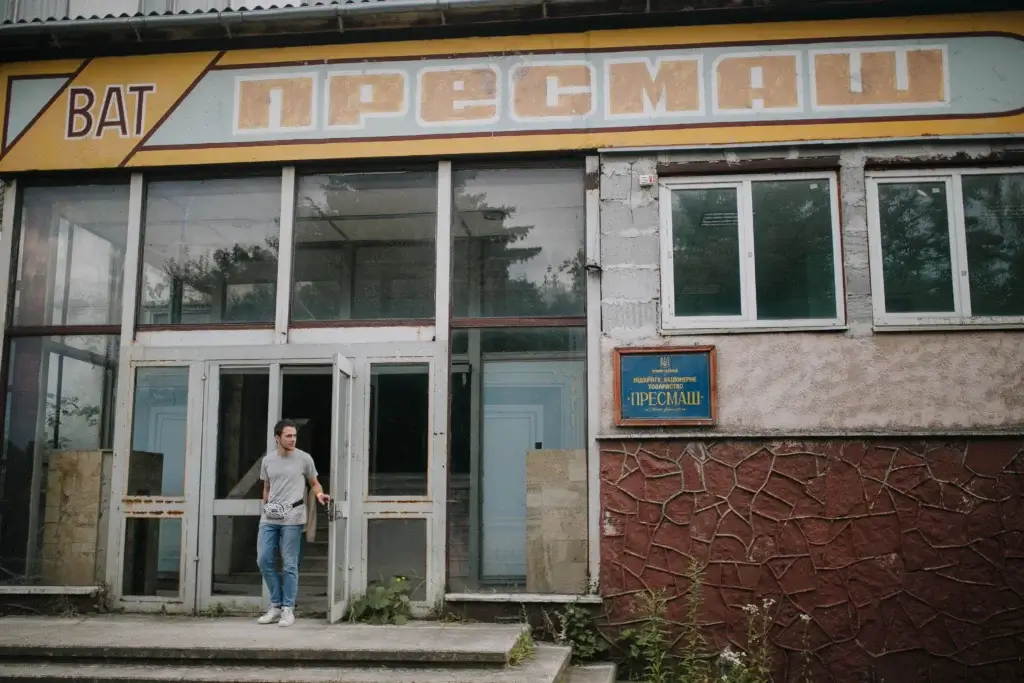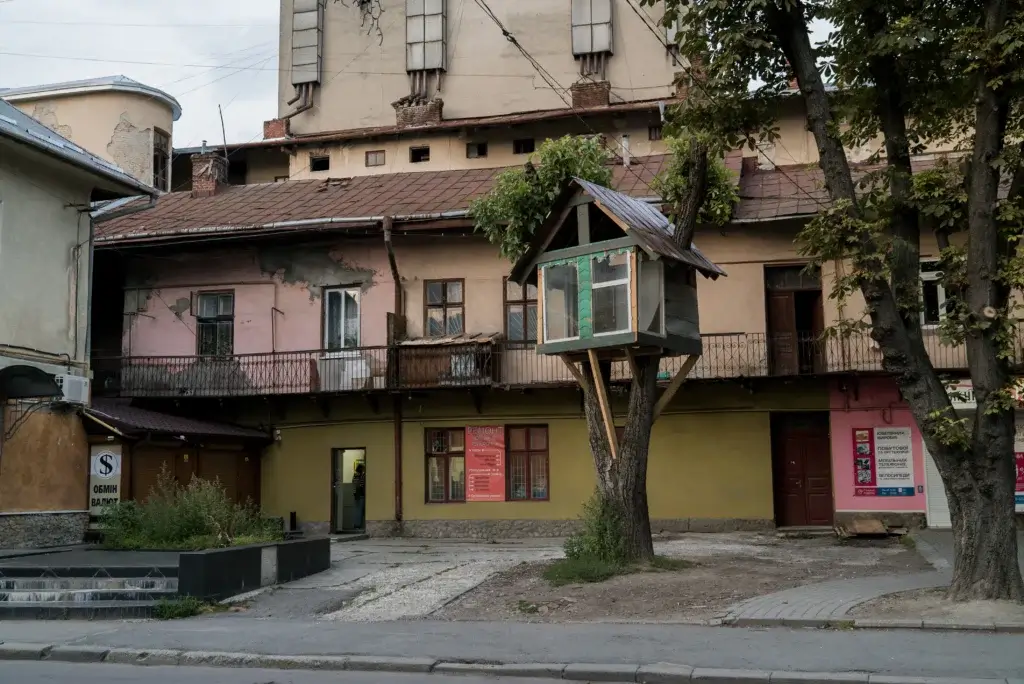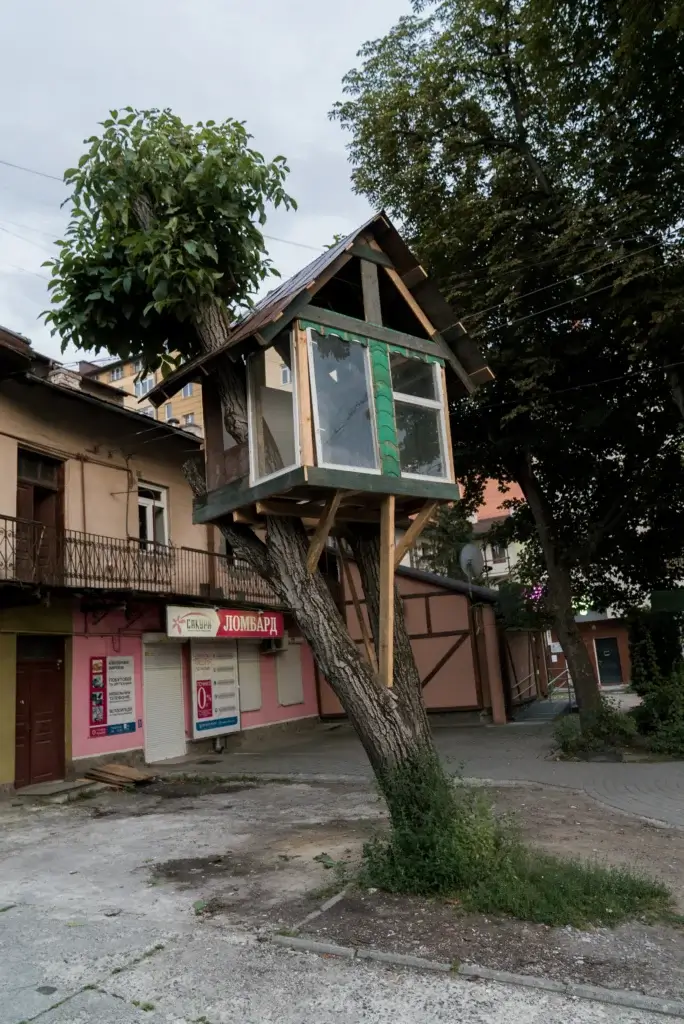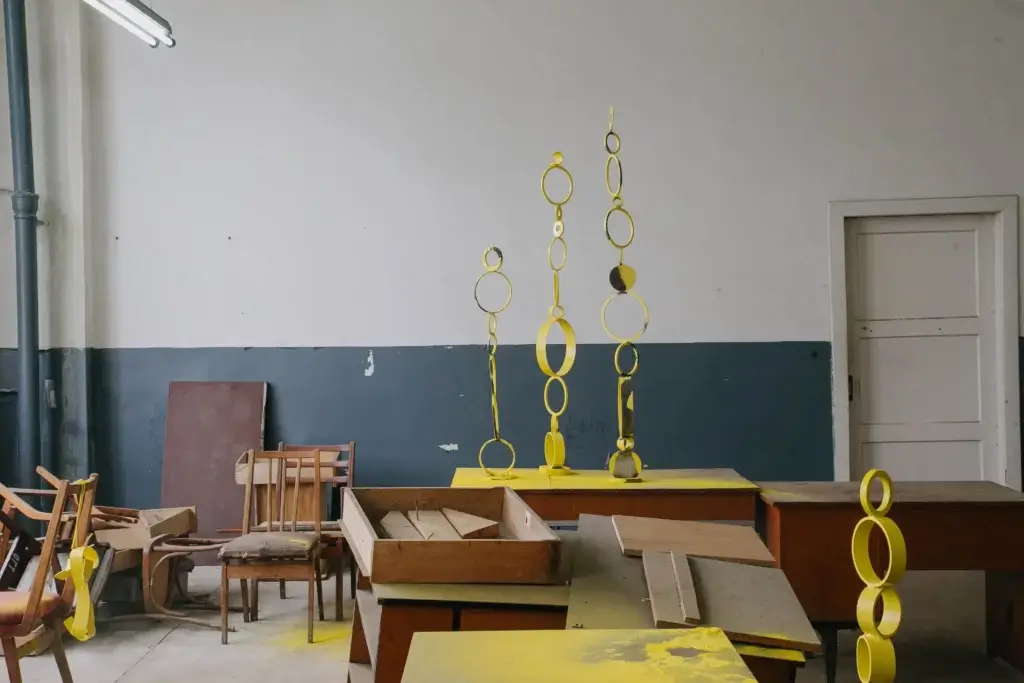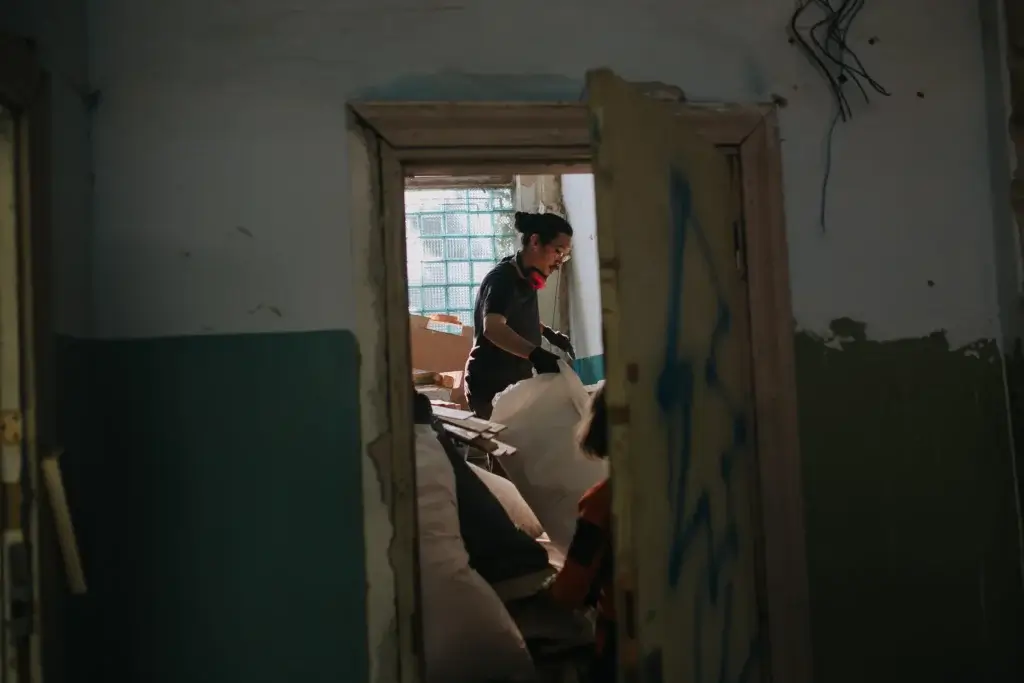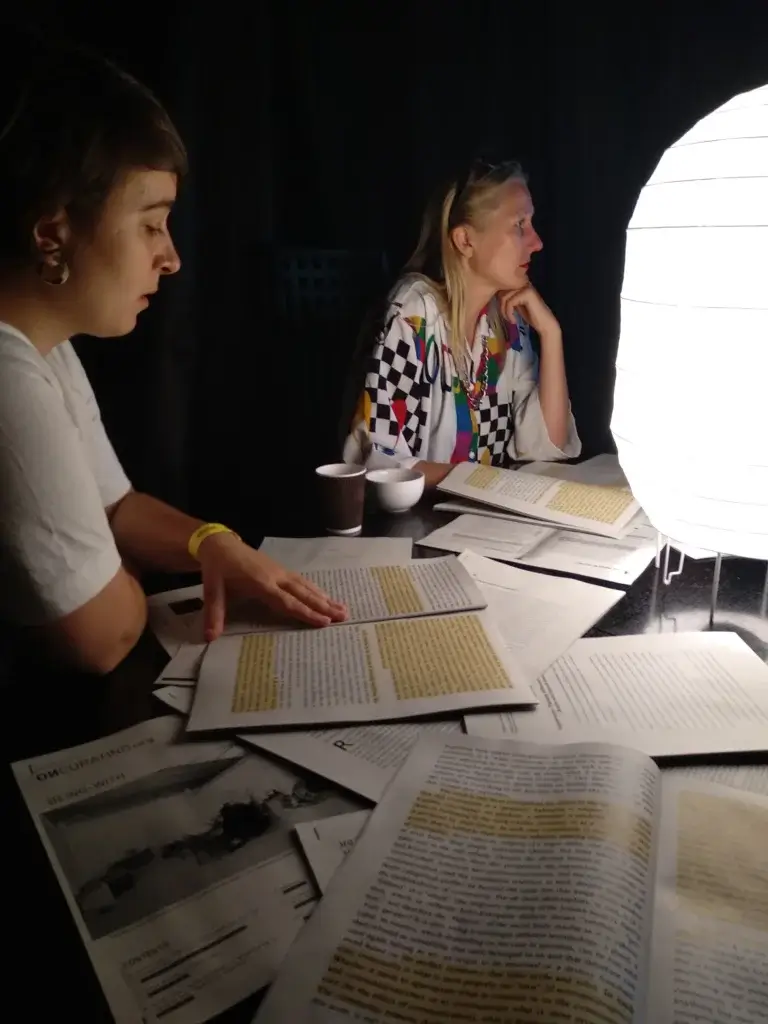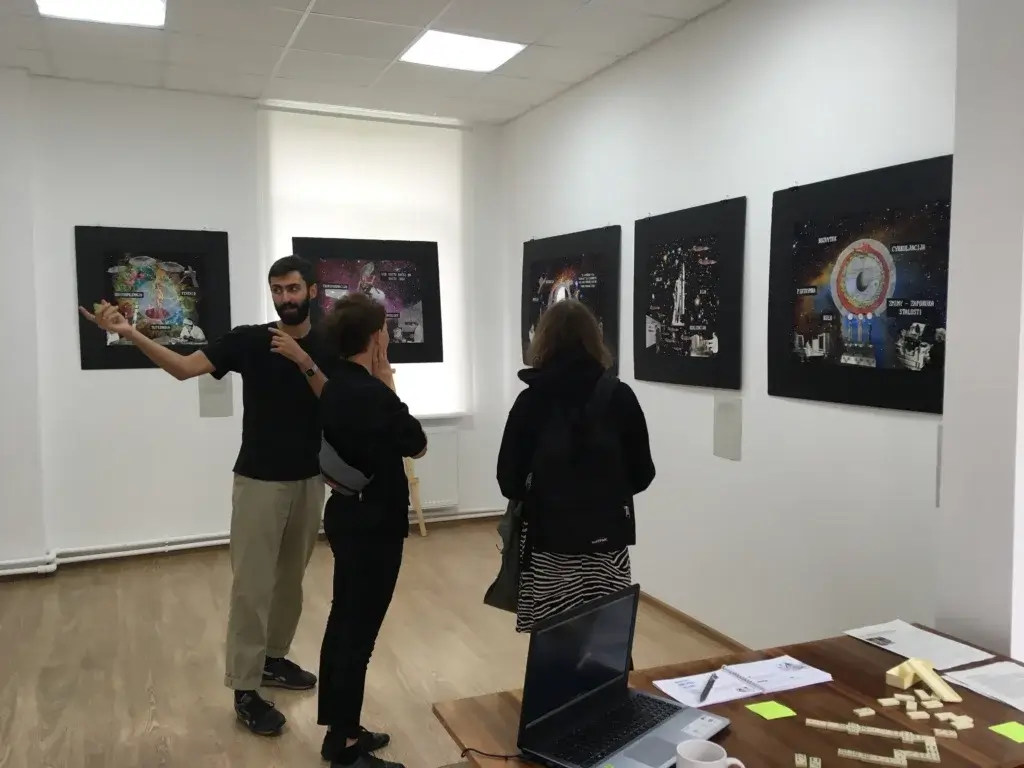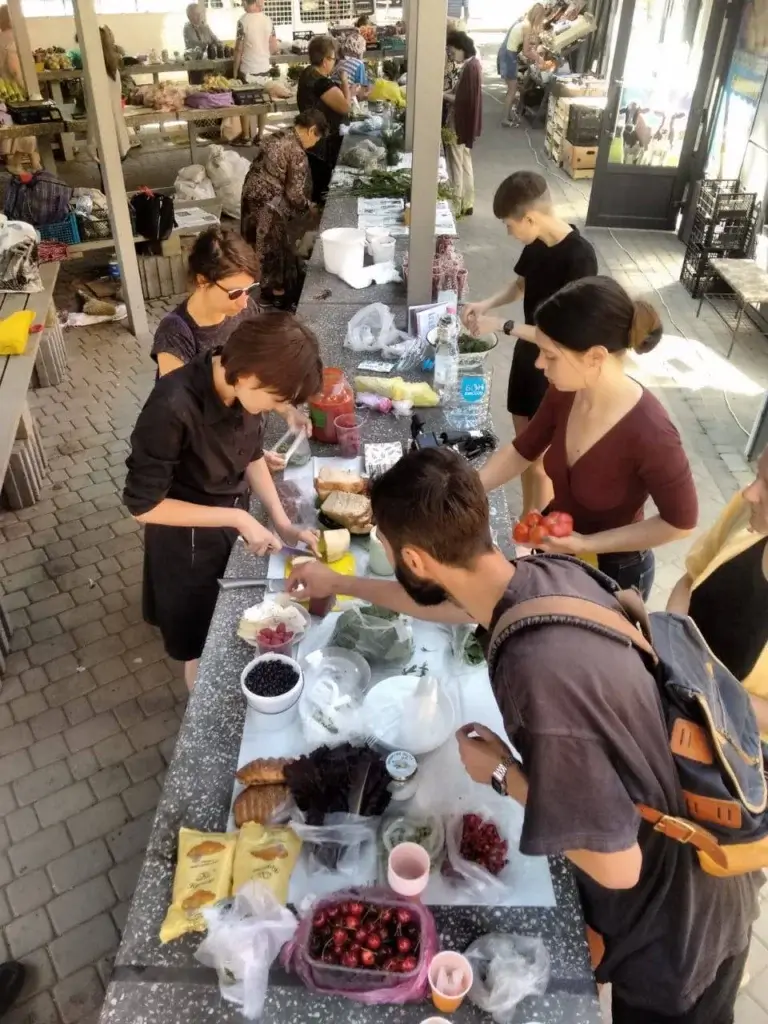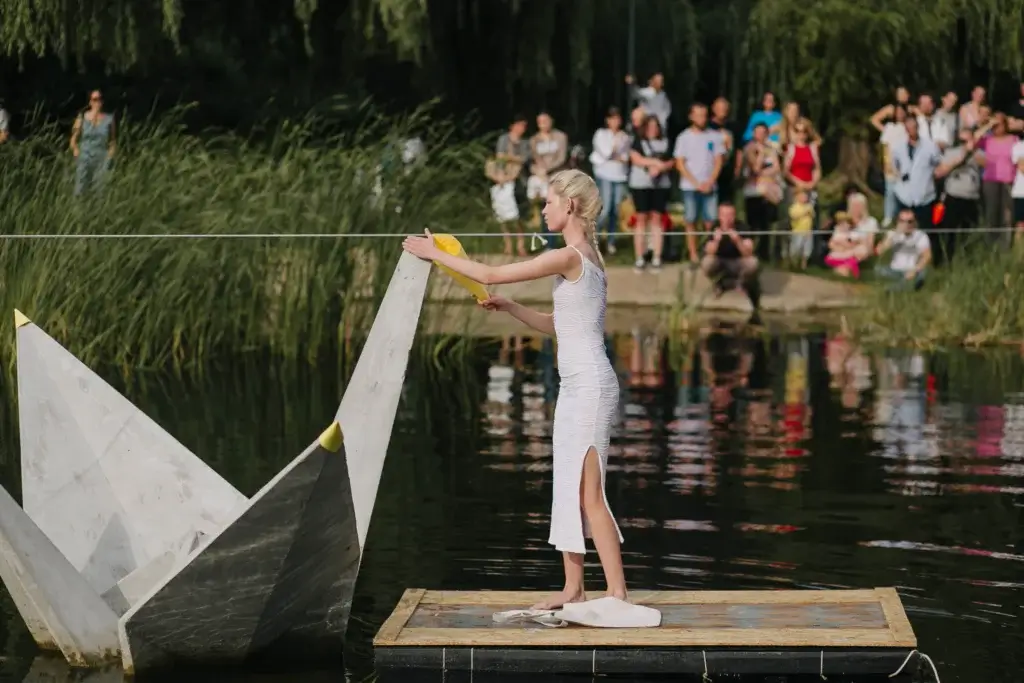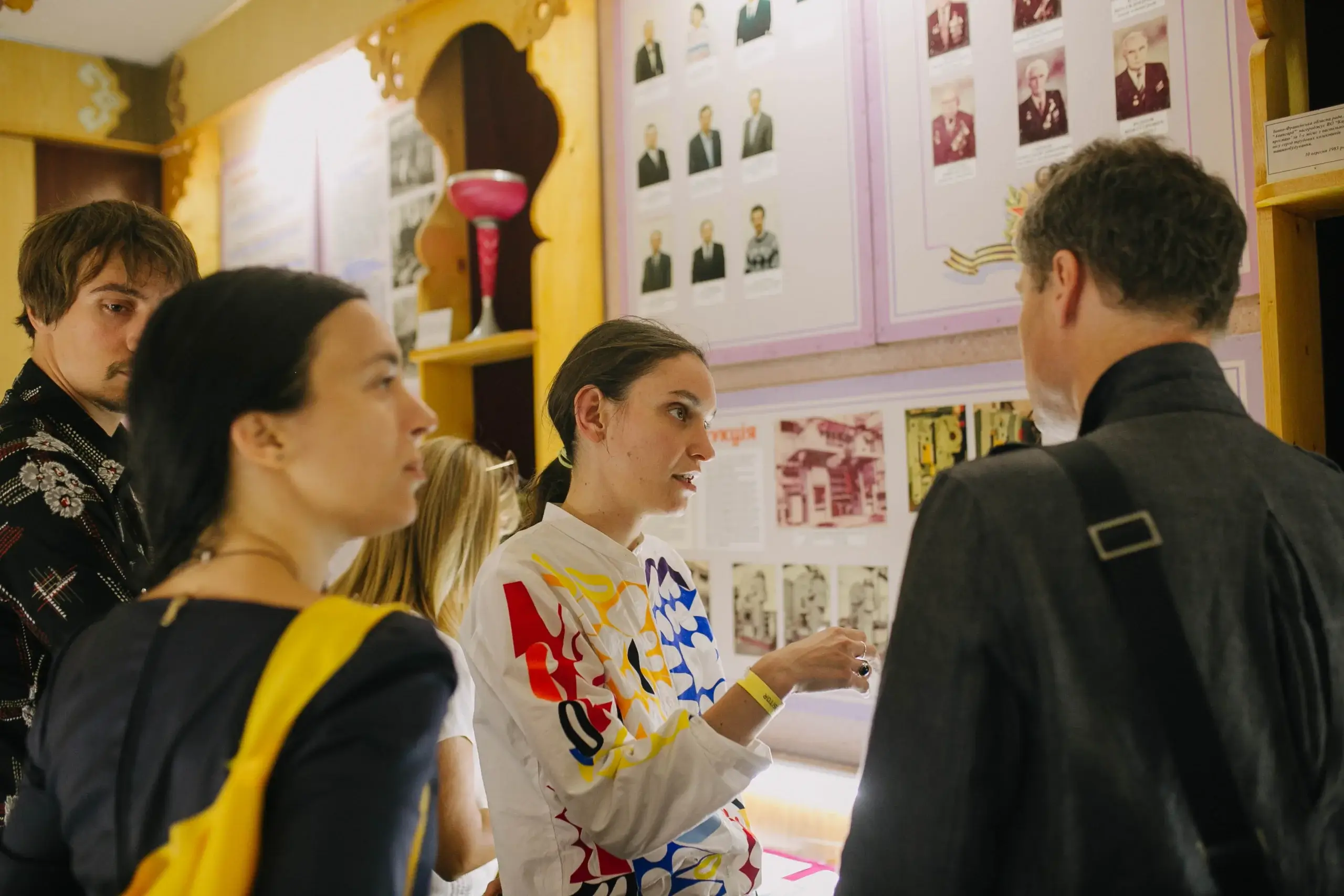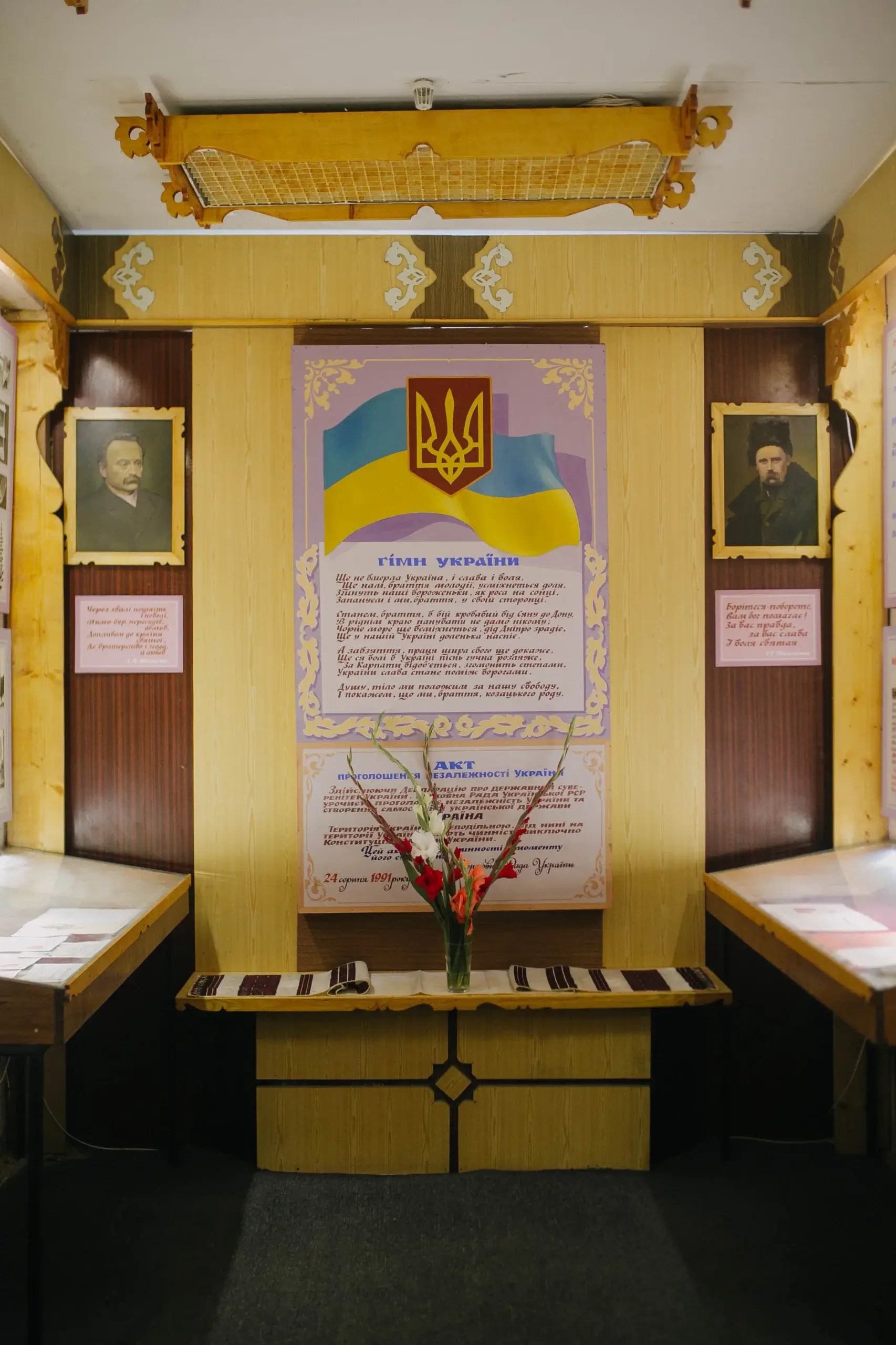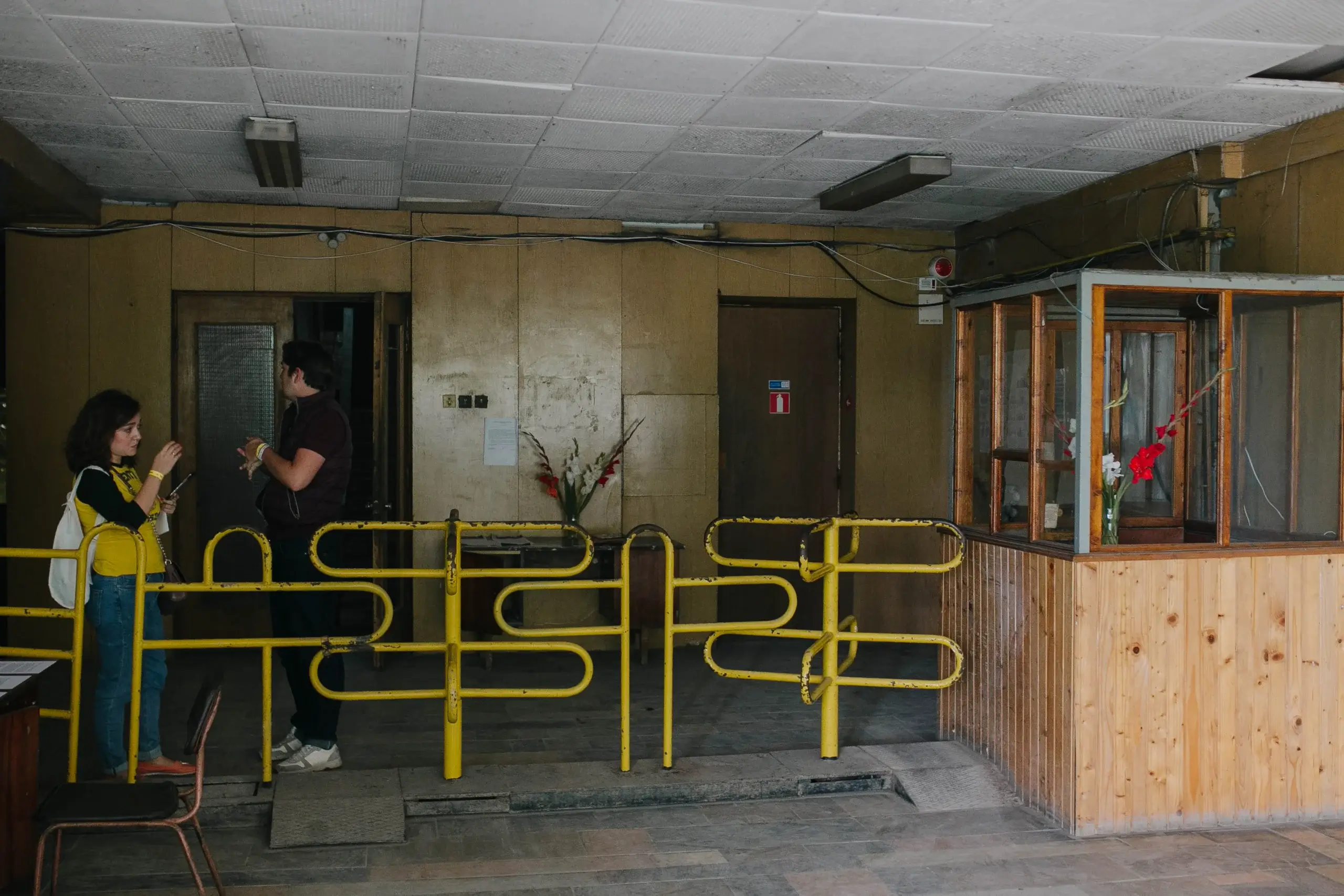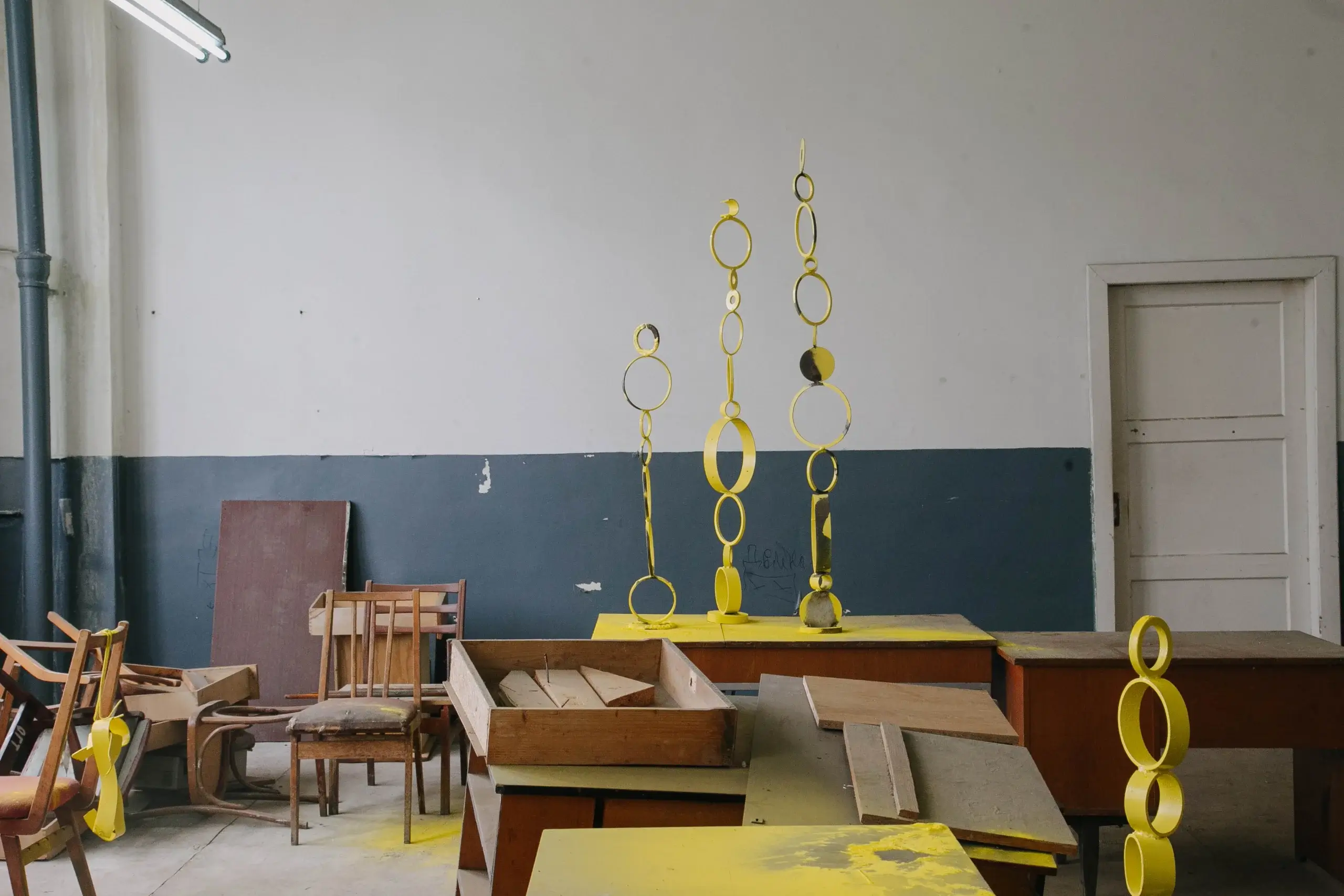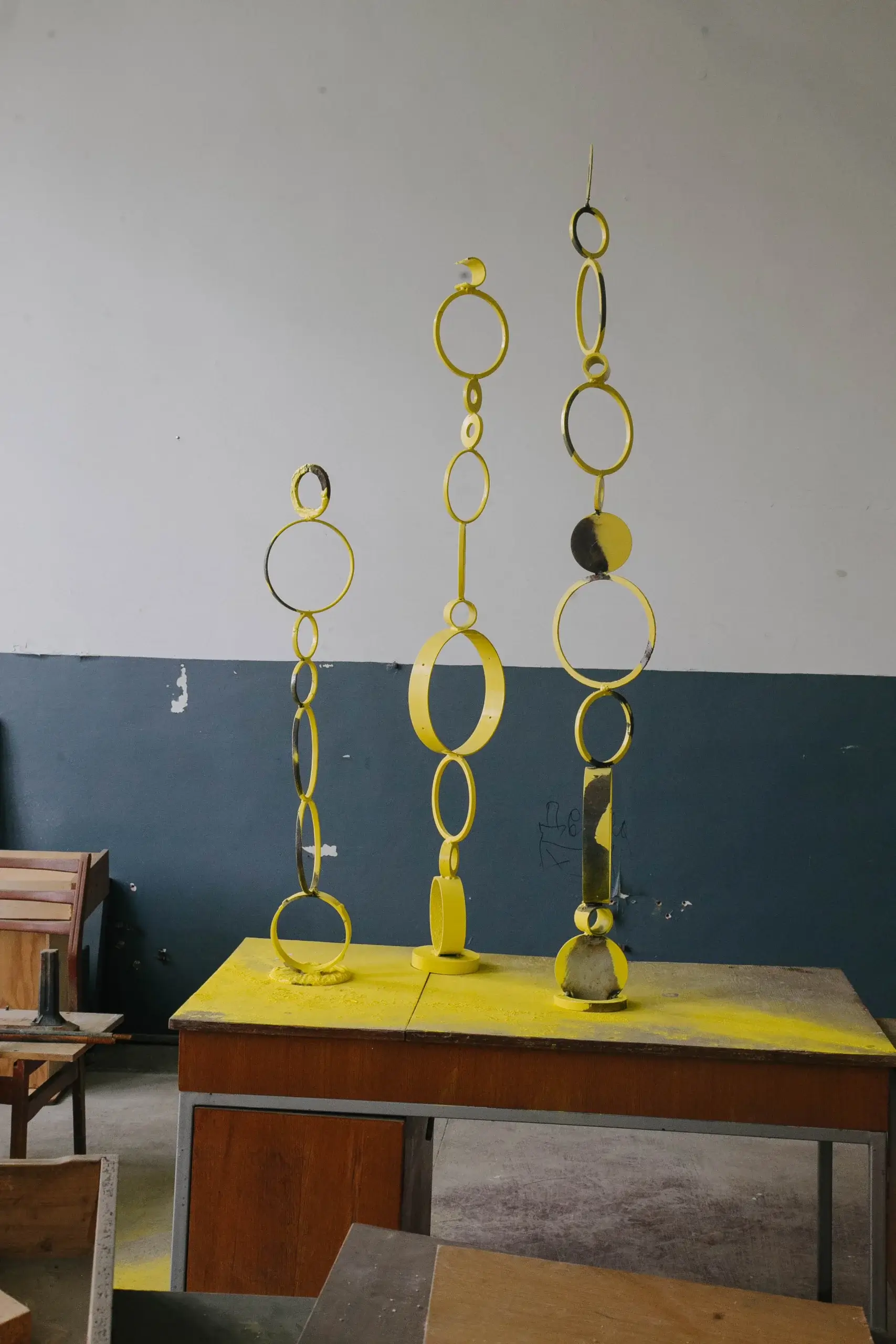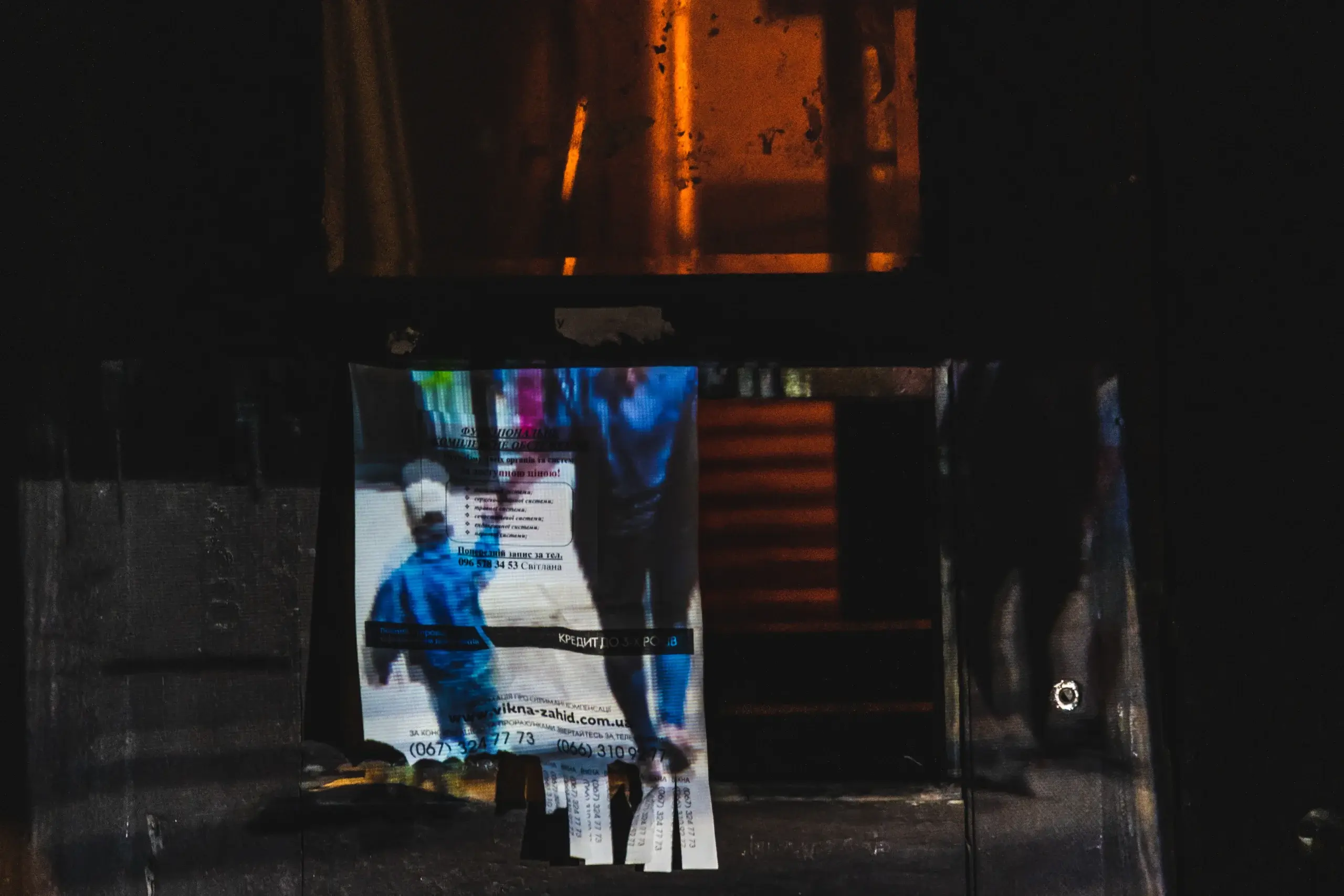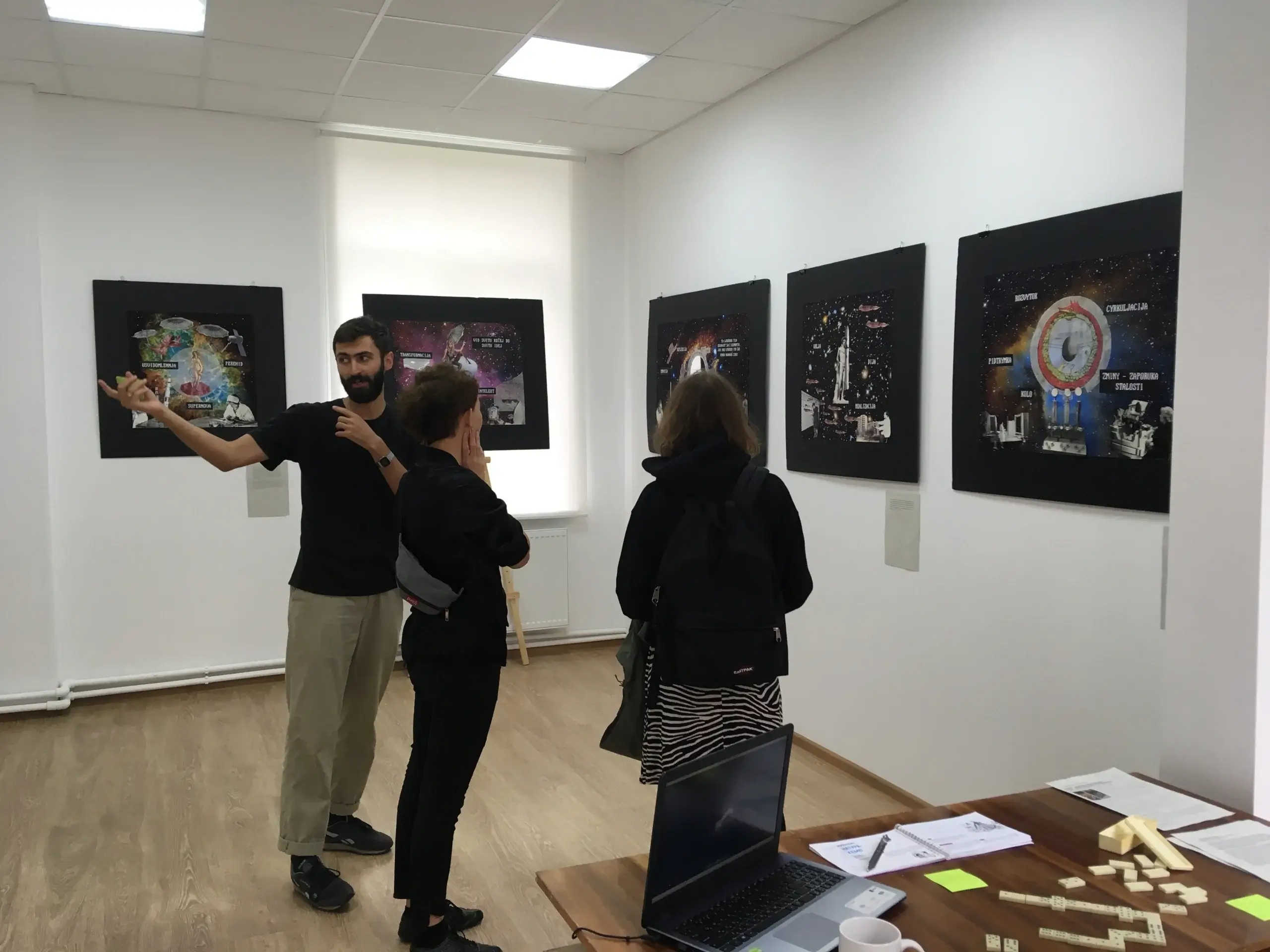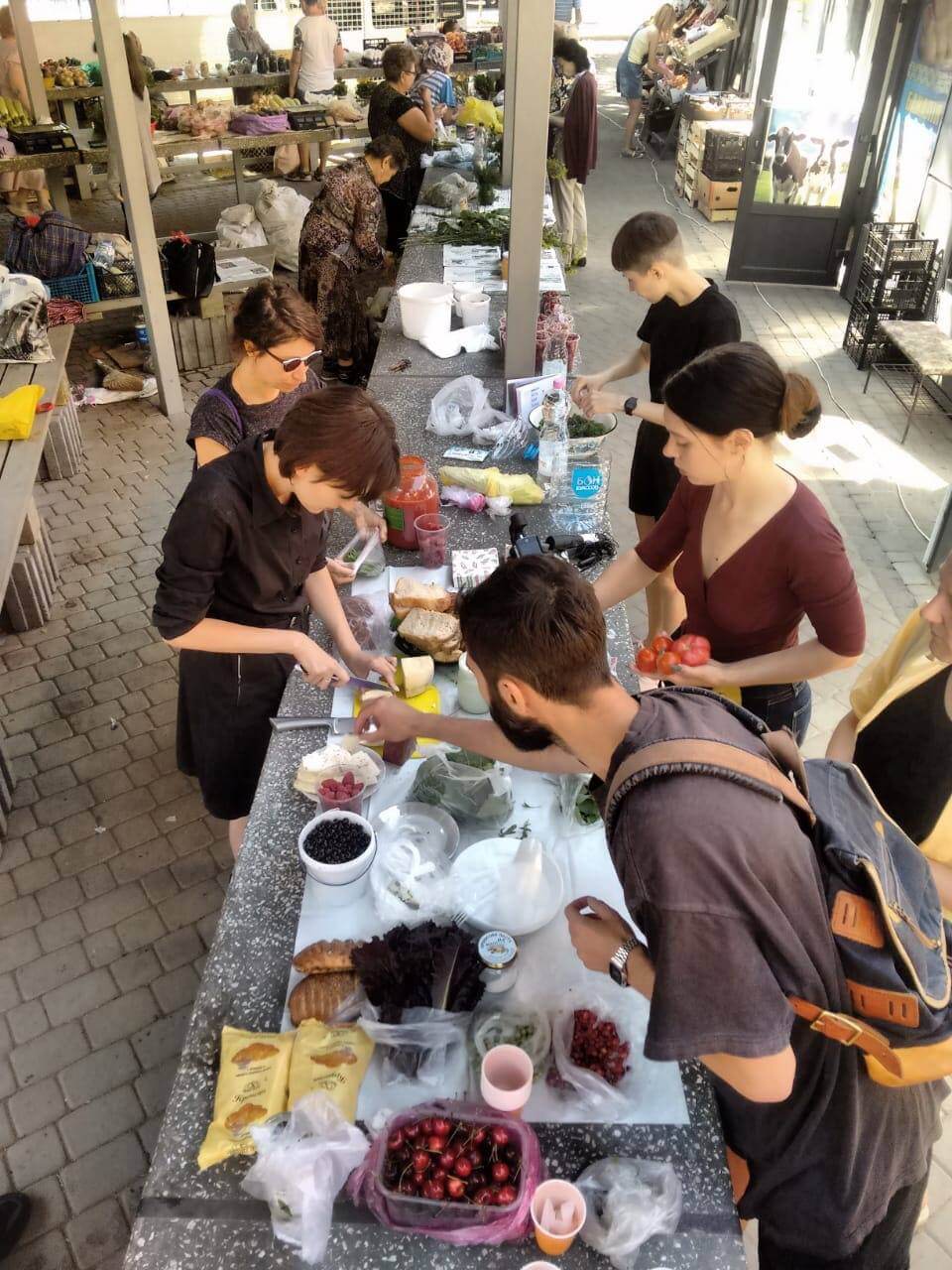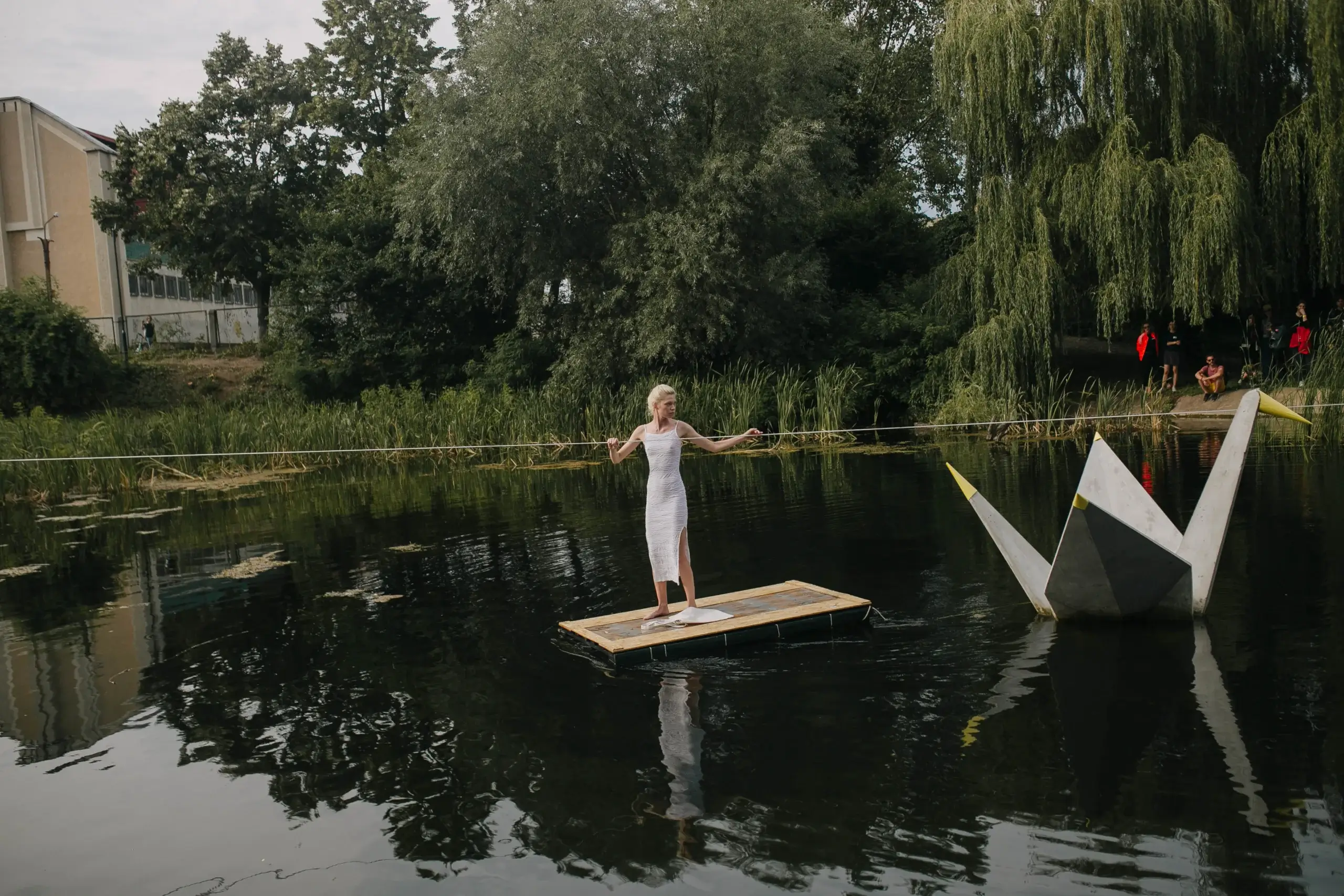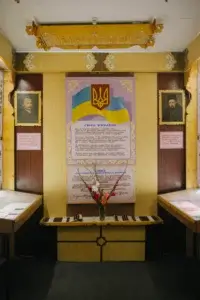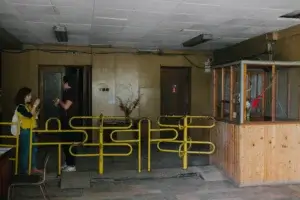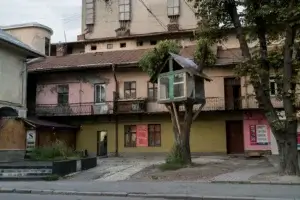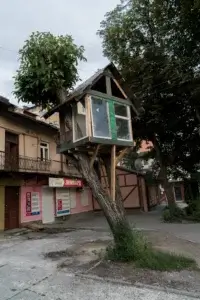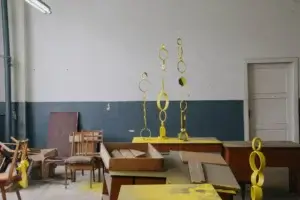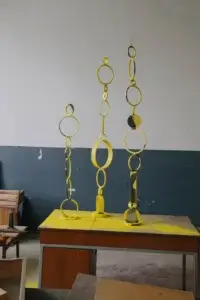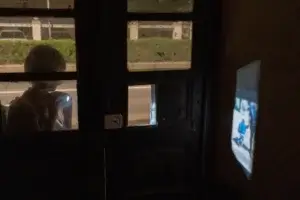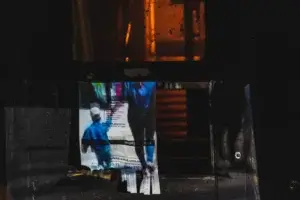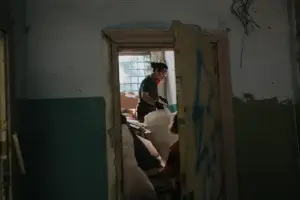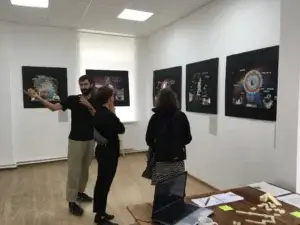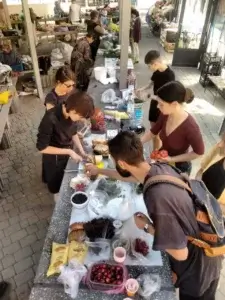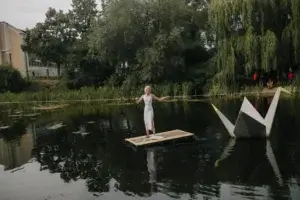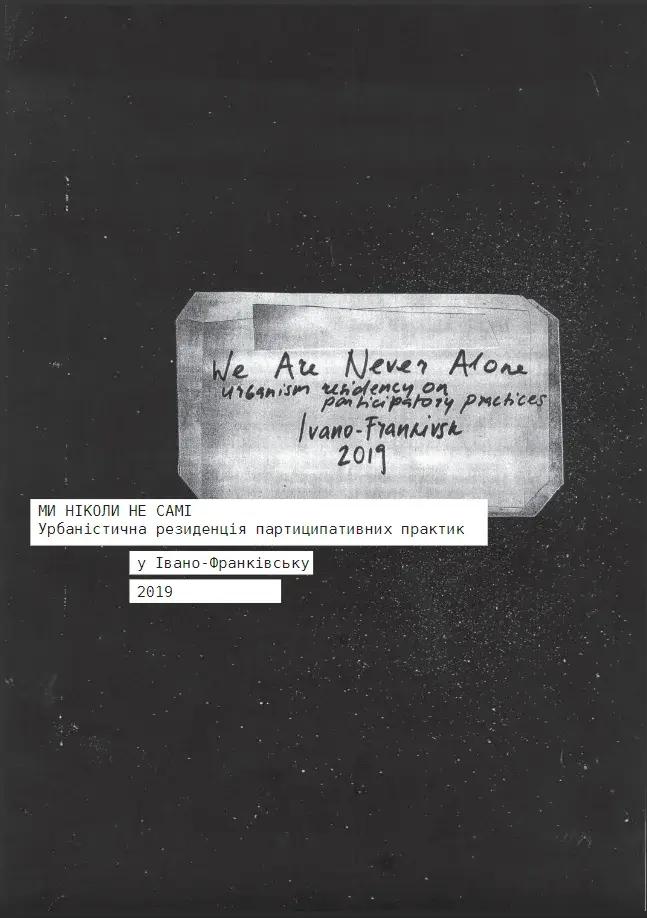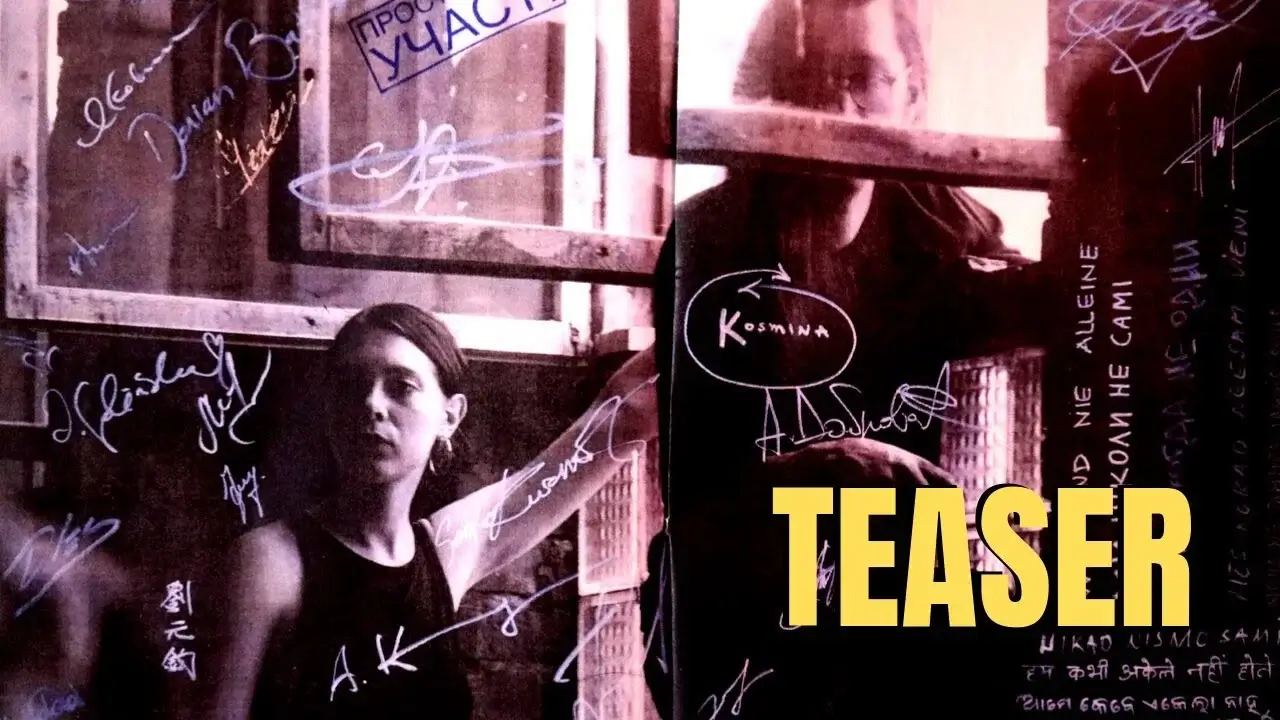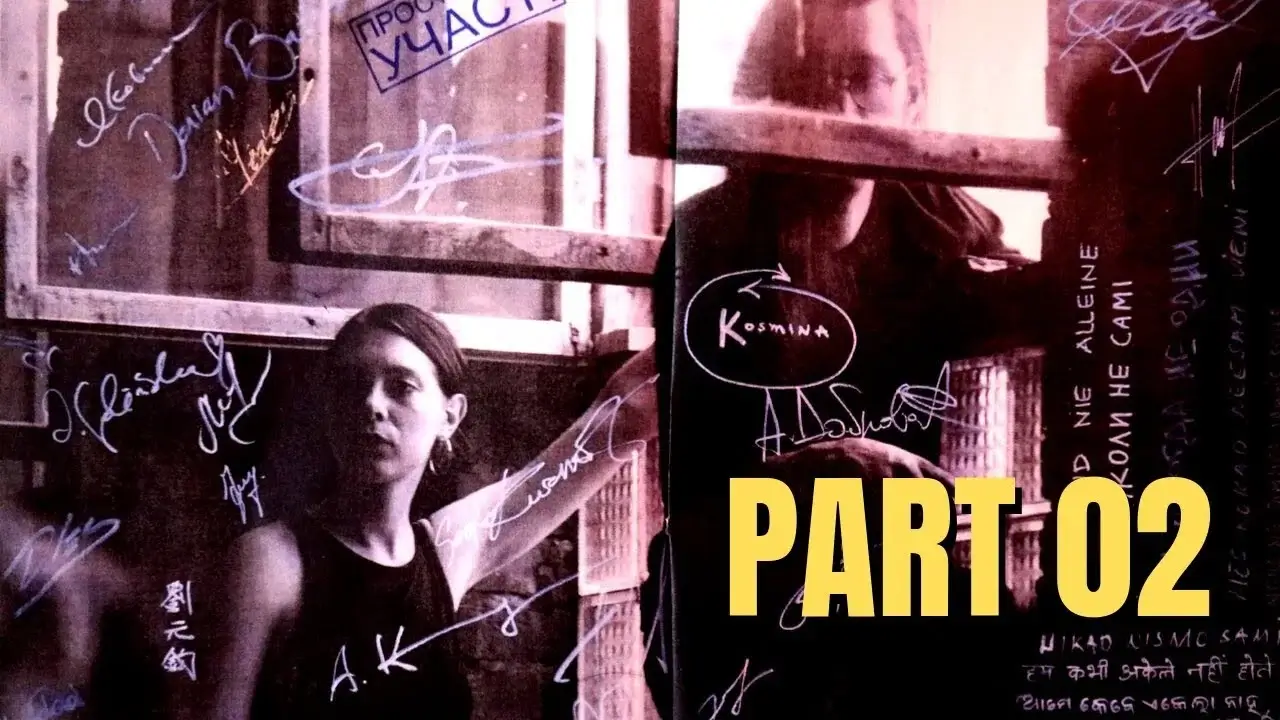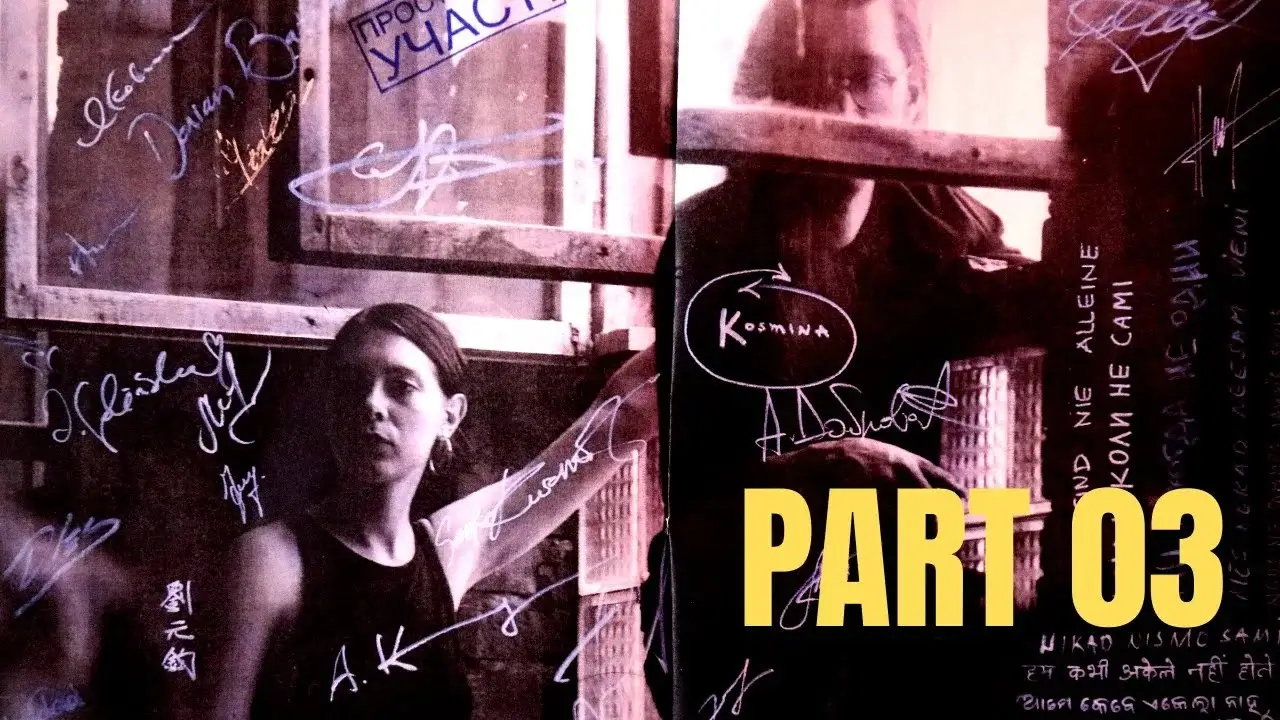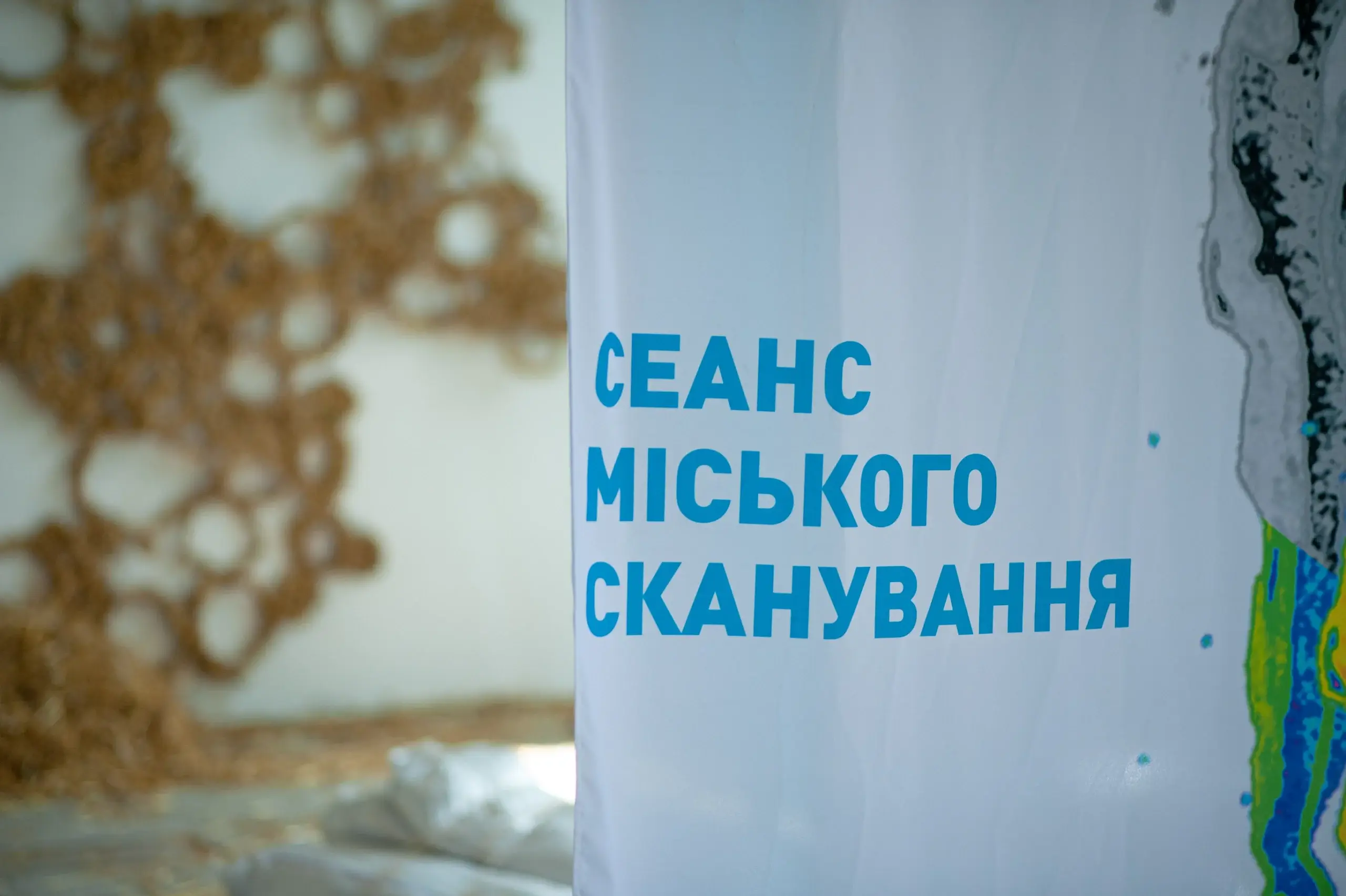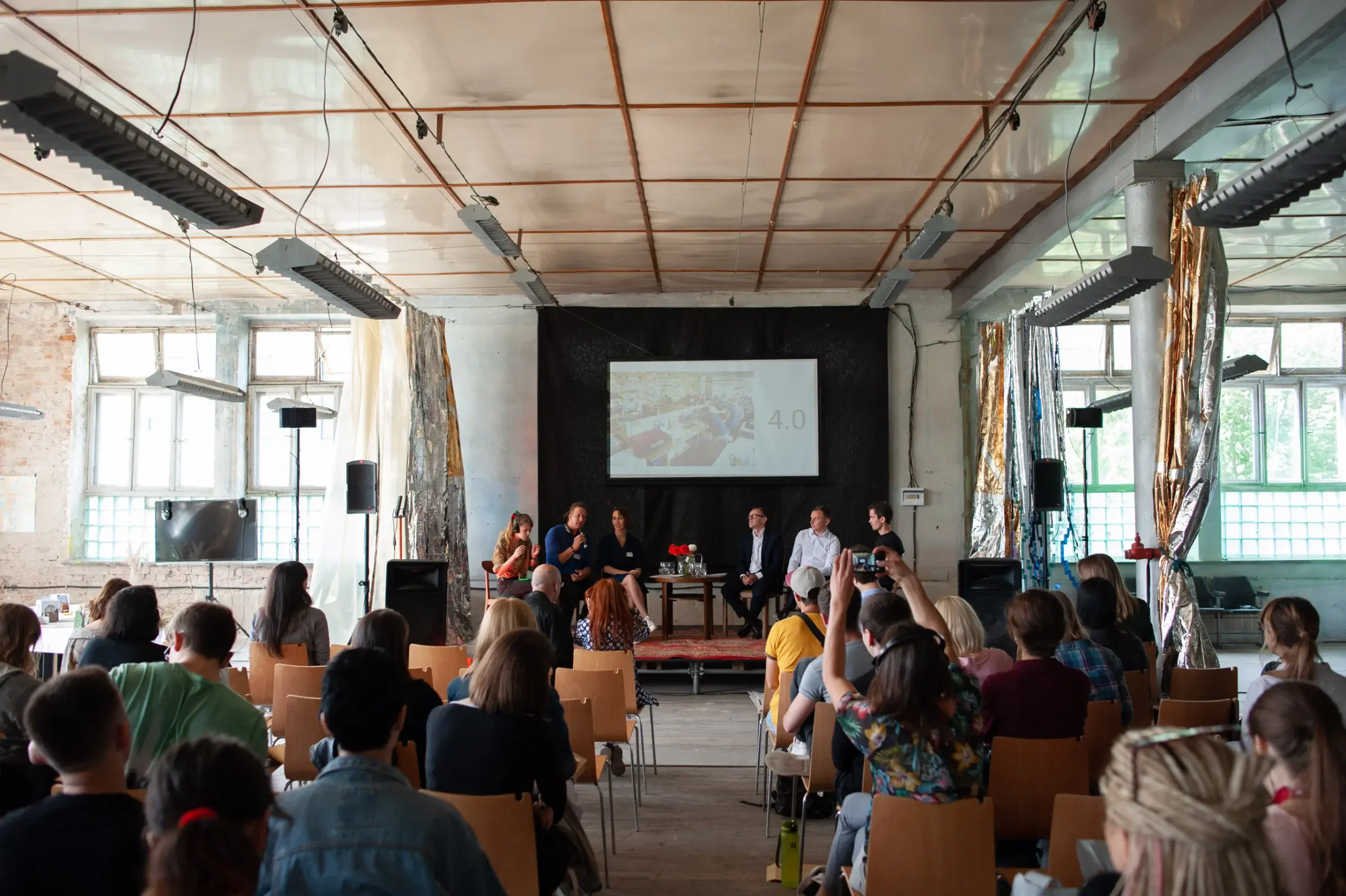WE ARE NEVER ALONE is a residency project curated by METASITU during the second City Scanning Session urban festival in 2019. We invited ten participants: artists, activists, urbanists, cultural workers, architects, writers, theorists, and scholars.
For a month, they interacted with the territory of the former Promprylad plant and the surrounding neighborhood in various ways, including conducting research, hosting public programs and events, and more. Together, they reflected on, experimented with, and proposed new forms of urban participatory practices. Participants were able to connect and form groups based on shared involvement and commitment to the cause.
“Through the WE ARE NEVER ALONE project, we sought to establish new foundations of relationships, understanding the limitations and threats of this format and maintaining a well-founded self-awareness,” the residents shared.
The MANUFUTURING revolves around the possibilities for the Promprylad plant, located in the center of Ivano-Frankivsk, to become a post-industrial space. Currently, as its industrial functions are dwindling, it is undergoing significant social and structural changes. Hence, the residents are exploring various participatory practices that could help them better understand Ivano-Frankivsk’s space. They are examining the resources and limitations that exist for artistic interventions and the implementation of social justice in this space.
“We aim to comprehend Promprylad’s transformative processes beyond established divisions, recognizing the array of interactions, interests, tensions, opportunities, and potential connections between individuals and groups because we are never alone.”
PARTICIPANTS
Livia Dudareva and Eduardo Cassina — METASITU tandem, curators
Dana Kosmina — independent architect and artist
Dibyendu Mrugaraj — videographer, director
Olya Zovska — artist with an architectural background
Sasha Kurmaz — post-conceptual multidisciplinary artist with a graffiti background
Alice Haddad — researcher interested in the formats of artistic and spatial mediation
Sasha Popruha — intermedial artist
Illia Yakovenko — self-proclaimed artist, curator, poet and spectator, precarious cultural worker
Tereza Yakovyna — stage designer, curator and interdisciplinary artist
Tijana Cvetković — visual artist
Klodiana Millona and Yuan Chun Liu — spatial designers and researchers working together as millonaliu
Zuza Golińska — visual artist
PROJECTS
- [RE]staging partisipation
Olya Zovskaya, Illia Yakovenko
The project [Re]Staging Participation revisits the past participatory workshops in the City Scanning Session 2017 festival framework or was further initiated in Ivano-Frankivsk by the festival organizers. It is an artistic inquiry into the phenomenon of participation, an attempt to understand its social and political function, its meaning to the people involved, and its influence on them and the city. During the residency, artists visited sites of past workshops, collected their material traces, and interviewed participants and organizers about their experience. During the festival, the artists will collectively reenact some of the workshops with their organizers, their participants, guests of the current festival, and everyone interested in participating. A reenactment is an invitation to collectively reflect on experiences that people had during the initial workshop, to recollect and share memories, and to produce further discussion about the political meaning and potential of each workshop and about structural hierarchies and power relations by which the workshops were affected. The [Re]Staging Participation exhibition at “Open Workshop” on Promprylad will display collected objects, research materials, and video documentation.
Restagings:
- [Re]Staging: Three Courtyards
- [Re]Staging: Natura-Camp
- [Re]Staging: Promprylad. How does it work?
- [Re]Staging: Swan Festival TBC!
- [Re]Staging: Ukrainian Archipelago TBC!
- [Re]Staging: Village Idiot
- (No)thing(s) in common
Alice Haddad
#1 Literary research on “communitas” is the foundation as much as the horizon for the explorations I am undertaking during this residency. My proposal is rather a moment in the exploratory process than an end product. It consists of sharing a selection of literary excerpts from my current research on the notion of community and its combination with a series of subjective observations and/or conversations that I frame/curate for this occasion. Through the confrontation of two discursive explorations, this proposal attempts to make the constant negotiation between objective and subjective interpretation apparent. The reference list or bibliography of the project, which usually appears as endnote if at all mentioned is amplified to become the centrepiece in the form of a reader, and the story serves glue as much as diversion to form a narrative about communitas, while simultaneously inviting the public to make its own.
#2 [This parallel exploration may or may not integrate the subjective part of #1] I have been following Sasha K.’s tree house project and after several conversations with him, next to giving a hand if/ where possible/necessary, I’d like to take his project in the public space as an opportunity to reflect (with him) on the issues of deterritorialization and site-specific intervention, shelter and escape in and outside the urban fabric. It is an exploration on how the proximity with nature and solitary experiences can bring a moment of fruitful reflection on the idea of a shared environment. How the effects of deterritorialization vs. site-specificity can become a way to experience the coming together of a politics of difference found within a certain abstraction of place. This process consists of walks as research, research as excursions, including walks in the nearby countryside/mountain/forest (since I-F is considered gateway to the Ukrainian Carpathians) and the Promprylad neighbourhood.
A performative walk. The known dimension is a volatile form of perception. Time and distance are linked in a performative walk along Ukrainsoi Peremohy Street (formerly Akademika Sakharova Street), starting from the bus stop near the Regional Perinatal Center to the Promprylad factory, where the dimensions of urban life will be explored.
- Eco-action “Splav” / Persormance “Splav”
Sasha Popruga
The «SPLAV» project by Sasha Popruga consists of two parts, united by one purpose — the continuation of the dialogue, which was begun by previous urban and artistic practices between the inhabitants of the district and the workers of the revitalized Promprylad. Sasha uses various artistic media to reflect on social change, including text, photography, video, graphic design, installation, and performance.
The project was supposed to exist in public space until the next edition of the City Scanning Session festival. The idea of the project was to create an autonomous, multifunctional space in the center of Ivano-Frankivsk for the presentation of various art events and art projects. This space was supposed to become a new informal cultural place, an independent place for discussion and exchange of ideas, but was dismantled in two weeks after the opening.
- Leave us alone
Klodiana Millona and Yuan Chun Liu
In an attempt to frame some of the reflections gathered during our action research in the (working) factory our proposal takes the shape of a (mirroring) festival hosted by the workers of the (authentic) factory. A festival that acts, on the one hand as a celebration of this remaining and the peculiarity of its condition, and on the other hand as a (perhaps last) collective effort to mark a resistance in the current unfriendly environment for such a phenomenon.
- 01.What is progress? What is real? 02.Corner intervention
Tijana Cvetković
Factory corners as a possibility for small intervention that could trigger interest of those passing by with the possibility that they could engage or take something that is placed in the specific spot/corner… Factory ground is taken here as the only world there is and the workers as inhabitants. Am proposing this interventions as the means of communication… all will be recorded and presented in the theater. Forgotten theater as the platform for rethinking progress in the frame of unexpected artistic action structured as installation with people — lunch, performance, exhibition, installation…
- I. Post-tropical. II. Moons
Zuza Golińska
I. Post-tropical The project involves recycling clothes and textiles that are often being produced for the western European or US market. Once used, and not needed anymore, the clothes are being sent to eastern Europe and resold at the very low price at second-hand shops. In Ivano-Frankivsk, buying second-hand seems to be the main point of purchase. I am interested in how certain ideas, from written words to slogans, travel on textiles and end up in varying social contexts. The research project is based on working with leftovers of textiles and clothing. There is a certain attraction to dirt and the uncanniness of used textiles and the stories they carry. On the formal level,clothes are being deconstructed and separated into pieces, which afterwards are sewn back together into different forms. It is also a personal learning method of how to reuse rather than produce. It is in the process of deconstructing simple everyday items, like a t-shirt or trousers, that gives my project an added, symbolic layer. By taking textiles apart and analyzing them, I hope to reveal hitherto little understood economies of production, politics, social changes.
II. Moons. Produced from trash: the series of small sculptures are made from metal leftovers from Promprylad Factory in Ivano-Frankivsk, Ukraine. They are realized with resources and machines in the factory, giving them a yellow color coating, a characteristic yellow unique to the factory. Executed in collaboration with the factory workers on-site, my research-based methodology is an example of upcycling practice turned into art production. Coming from Gdańsk, a region that also has a unique history in terms of shipyards, manufacturing and production, a critical aspect of my practice involves using materials from local industries.
- Workers of INVISIBLE labor
Dana Kosmina
Dana Kosmina’s project “Workers of IN VISBLE Labor” tells about the not-archived history of the Presmash plant, one of the most powerful industrial sites in Ukraine in the past. Presmmash, as well as at other similar factories, has a “museum-museum of plant history”, which presents key events since its foundation in 1975. In the Pressmash room, the opening of which seems like the opening of a tomb through a layer of dust, the chronology breaks down in the late 80’s. Instead, from that time the company managed to survive both brilliant ups and irreversible falls. In the course of time, Presmmash adapted to the capitalist market, cooperated with international companies, developed new product lines and, in certain periods, was the leader in the quality of production in its niche. But the unstable political situation in Ukraine has played a dramatic role in the development of Presmash. The factory managed to survive corruption on the skin of the authorities, fictitious bankruptcy and, as a result, the loss of manpower and litigation in litigation, which continues to this day. The project explores the diverse sources in the media, publications about the history of the plant, and the documentation of the present, which continue and complete the already existing exposition in the “museum history of the plant”. At the same time, he has the opportunity to draw conclusions on the basis of the given spectrum of information. Apart from the history of the plant as a strategic unit, it is also the story of thousands of workers and their labor, which today is doomed to invisibility. The material products of this work are oblivious to the giants of the industry. In the expanses of the former factories and factories no longer produce: tapes, subway cars, rockets, bricks. The list can be led to infinity, passing through cities. The memory of a powerful industrial past dissolves and becomes just a romantic ruin. The workers who went to thousands of machines in the not so distant 70-80’s and worked out exhausting changes, creating the products of labor we still use, are released on a fortune and are still waiting for the promised benefits. Their products of labor have vanished in the present context and have become, as if, no apparent ghosts. Instead, a growing generation, fascinated by the awe-inspiring aesthetics of large-scale the remnants of the industry, today gives a second breath to this thrown room. They, like their previous generations, repeat the same route from home through the passage and to the shops. The sounds of techno are no longer from the machines, but from the columns filled with hangars, the change of newly arrived workers is just as exhaustingly long, but the products of labor from the material have become spiritual. So, on the one hand, the name of the exhibition reflects the historical and political aspects of the abandoned the industry, and on the other reveals the phenomenon of a new techno-breath. In both of these cases, the unifying factor is the modern non-featured work.
- Documentary about the festival
Dibyendu Mrugaraj
This particular video was part of a collaborative project of three different fellow residents/artists: Klodi Millona & Cam Liu, and Tijana Cvetković. Both their projects had locations in close proximity of one another, and their primary participants were also the same set of people (workers of Promprylad factory), therefore they decided to merge their projects and it was a natural collaboration. And, I (Dibyendu Mrugaraj) was there to make a documentary on the entire residency. So when the aforementioned artists invited me to screen a small video for the factory workers, I became a part of their project as well.
This video was screened during the mirror festival, inside Promprylad factory where the workers hang out and have lunch. The screening was the concluding event of the mirror festival, where after experiencing the festival the audience got to have a glimpse of how this festival came to be in the first place. Technically this video alone is incomplete because it serves as a part of the entire experience. Since we can’t recreate the festival again, it seemed appropriate to make it as a teaser for the upcoming full (feature-length) documentary, where you will get to experience not only the outcomes of the mirror festival but also the works of other artists from the residency, and how it feels to work together as a part of temporary community.


